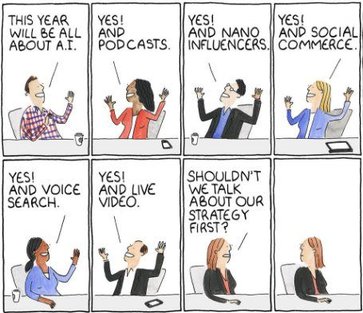If you’ve spent even a little time in corporate marketing, or anywhere near it, you’re taught very quickly that numbers run the show. They are the scoreboard, the validation, the fear, the brag, and the post-mortem. Moreover, they are definitely the pitch. Even when the work is creative, you learn to speak in percentages and charts. Because everyone around you is doing the same thing, you accept it as the standard. The only measure of success becomes reach, not meaning.

I have worked with this mindset for years. Honestly, it makes sense on the surface. If I post something, I’d want people to see it. If I ran a campaign, I’d want more signups, and if I made a video, I’d want more views. Everything had a material target and if it was met, I could move on. In a world where everything was a fight to the top, nothing is intrinsically wrong with this.
Except that after a point, I’d imagine, the work would stop feeling like anything at all. It would be dumbed down to just a process. I think about this on and off, but it’s easy to fall back into the rut of “metrics that we must track”.
Recently, there was a change. During an internal meeting at Frappe, we discussed our marketing philosophy. Knowing Frappe, you can guess the goal has never been to just grow. Quality is as important. A question was asked: "What is the point of every marketing asset we create?" The answer was simple enough to be obvious but rare enough to be surprising, to me at least.
“To tell good stories.”
Hearing this probably woke my brain up a little. For the first time, the priority was not numbers. It wasn’t based on the speed of growth, it considered the quality of the story. If we made something that was meaningful and interesting, the right people would find it. Not by luck, but by alignment. Numbers still mattered, they would still prove useful. But it wouldn’t be the entire point.
This is probably the moment I realised how conditioned I’d been. My first instinct was still, “Why would a company not want numbers?” Because almost every project I’d worked on before, numbers were currency. They made everything feel transactional. If I created something brilliant, but the metrics dipped, it somehow became worthless. And if something average became popular, it was a success. Retrospectively, attaching the premise of “good work” to numbers wasn’t the best idea. This cycle can become confusing rather than motivating.
It’s time to start unlearning.
Take The Frappe Podcast, for example. Eight episodes in, and the measure of success has never been about view counts. Not once. I’ve been told time and again that conversations matter more than performance. Even though I find myself secretly obsessing over views in the first 24 hours, I try not to depend on them. And funnily enough, the moments people remember are never about the popularity of any episode. It’s always “I loved the story where…” or “I thought this perspective was new…”. And that has given me more long-term motivation than reaching 1000 views in 24 hours ever will.

Credit: Marketoonist - Tom Fishburne
When you think about it, there is a relief in this kind of approach. There is freedom to stop chasing the illusion that everything has to be viral. Instead, there is an opportunity to focus on whether the work says something worth saying. The pressure shifts to creative pressure instead of numbers pressure. Meaning I could spend my time writing in depth or asking better questions.
But ironically, storytelling is so much harder than making something viral.
Telling a good story is not based on a set, repeatable process. It needs time, patience, and some proper thinking. It can’t be scripted or templatised. It has to be found by talking to people and listening to them. You need to read the emotions between the lines. Storytelling is a craft, probably the hardest one of them all. And I think I forgot that for a while because the industry makes it feel like an afterthought.
A few weeks ago, I was writing a script for a set of FAQ videos that was so filled with information that it felt like ChatGPT could’ve done it in 10 seconds. It had data, accuracy, everything except a soul. To me, it felt like the project required information, nothing else. And I was called out on it. The problem was that I only tried to be correct, not helpful. I rerouted, and now, on my way to make something that people might actually enjoy watching.
Even outside my own work, the examples that stick with me are the ones built on emotion. Zomato’s sense of humour. Piyush Pandey’s honesty. And the fact that Wordle was created not for “growth” but to keep a loved one entertained. The reason we remember these things is that they make us feel something.
The meeting at Frappe just reminded me of that. Tell a good story. That is the job. If you do that well, the people who like such stories will become your audience. And they are the ones you actually want. The numbers will follow at their own pace or they won’t. But the work will still stand.
I am not pretending I have completely changed my mindset. I still check analytics. I still get curious about trends. I still feel the pull of “what if this could get more views.” But I am also learning to not let those things drive me. It is a transition. A slow one. But I like that I am thinking more about the work itself, and not just how it will perform.
There is a line I keep coming back to.
The quality of what you create shapes the quality of the audience you attract.
If you chase momentary attention, you will get it. If you chase depth, you will attract depth. Somewhere in the middle of all the confusion about metrics and growth, I think this is what I was trying to understand.
So for now, it feels good to choose the story. Not because numbers don’t matter, but because they are not enough. Impact is not a chart. It is a feeling. And if something you make reaches one person in the right way, that is still a win.




